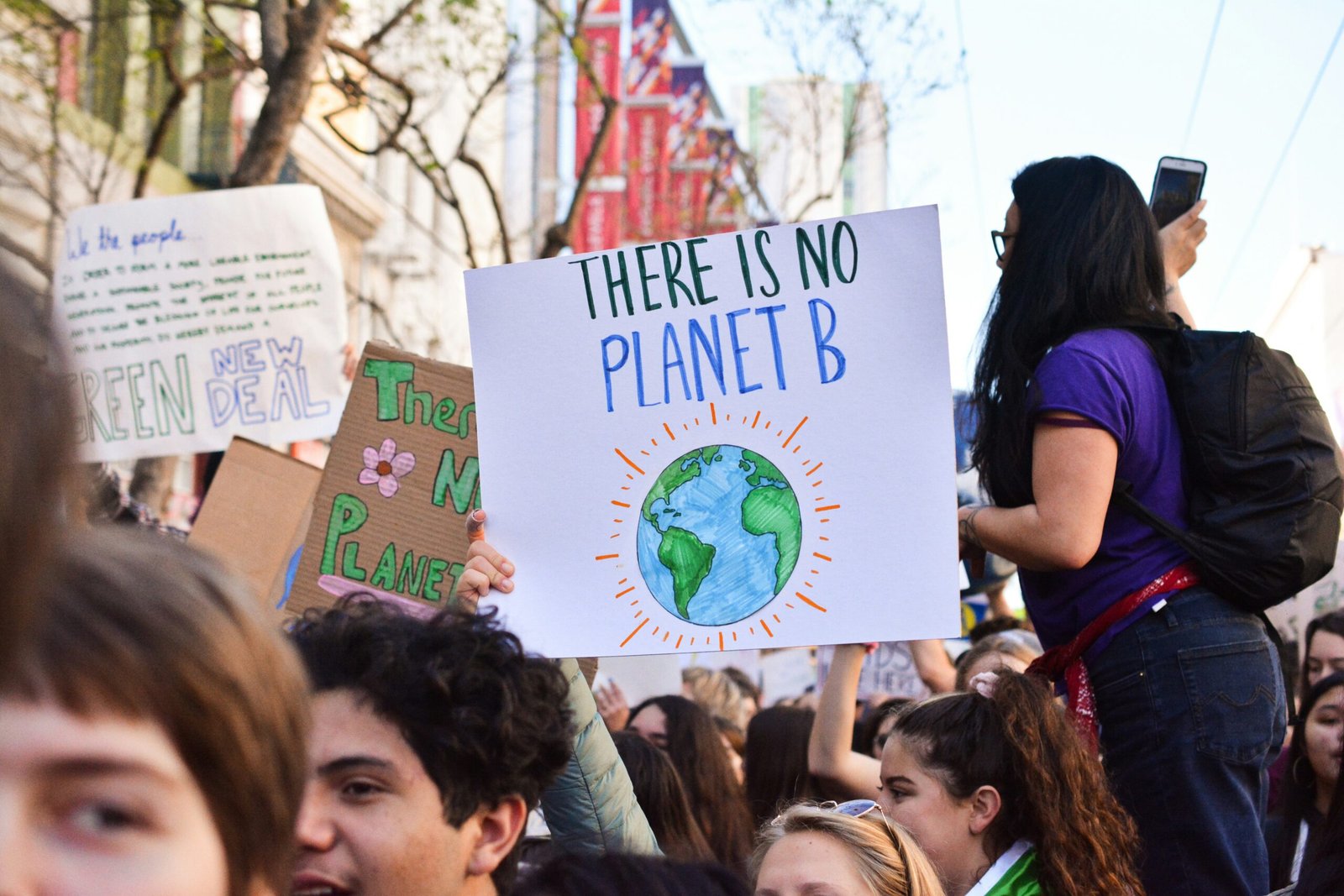The Role of Christianity in Climate Action Movements
Introduction to Climate Action and Christianity
The intersection of climate action and Christianity has gained significant attention in recent years, as the urgency surrounding climate issues intensifies. Climate change poses a threat not only to the environment but also to social justice, economic stability, and human health, prompting a growing number of faith communities to engage actively in advocacy and change. Many Christians view climate action as a moral imperative, emphasizing the biblical call to stewardship over God’s creation. This perspective fosters a profound sense of responsibility toward caring for the planet, which is understood not merely as a resource but as a sacred gift.
Historically, Christianity has had a complex relationship with environmental matters. In earlier centuries, the focus was often primarily on human dominion over nature, which led to exploitative practices. However, a shift has occurred, particularly since the late 20th century, as many theologians and Christian leaders began to articulate a more compassionate approach to the environment. They argue that caring for the earth aligns with Jesus’ teachings and the broader ethical frameworks found within the scripture. This evolution reflects a growing acknowledgment that humanity’s well-being is intricately linked to the health of the planet.
As climate change accelerates, the call for collective action has never been more crucial. Various Christian denominations have taken steps to address environmental concerns, with initiatives focusing on sustainability, conservation, and social advocacy. Faith-based organizations are emerging as vital players in climate discussions, connecting spiritual values with environmental stewardship. This engagement highlights a strong commitment among Christians to promote ecological justice and actively participate in climate action movements. Consequently, the role of Christianity in these efforts continues to develop, shaping a collective response to one of the most pressing challenges of our time.
The Theological Foundations of Environmental Stewardship
The concept of environmental stewardship is deeply intertwined with Christian teachings, emphasizing the intrinsic value of creation and the responsibility of humanity to care for it. Central to this belief are various biblical principles that highlight stewardship, justice, and the sanctity of nature. One significant scripture that outlines this duty is Genesis 1:28, where humanity is called to “fill the earth and subdue it,” indicating an active role in nurturing and protecting the environment. This directive underscores the overarching responsibility Christians have as caretakers of God’s creation.
Furthermore, Psalm 24:1 asserts that “the earth is the Lord’s, and everything in it,” reminding believers that the natural world is not merely a resource to exploit but is sacred and deserving of care. This perspective fosters a sense of accountability among Christians, encouraging them to advocate for sustainable practices and to engage in efforts that counteract climate change. Such theological foundations serve not only as a moral imperative but as a clarion call for action within communities of faith.
In synthesizing these theological insights, it becomes evident that the Christian faith provides a rich framework for understanding the relationship between humanity and the environment. As believers draw on these scriptural teachings, there is a growing commitment to action in climate movements, illustrating how faith can fuel a robust response to the pressing challenges of environmental degradation and climate change.
Historical Context: Christianity and Environmentalism
The relationship between Christianity and environmentalism is complex and has evolved significantly over the centuries. Early Christian teachings often emphasized stewardship of the Earth, derived from the biblical narratives found in Genesis which advocate for humanity’s responsibility to care for creation. This foundational concept fostered a sense of duty among many Christians to engage with the natural world in a manner that prioritized conservation and sustainability.
During the late 19th and early 20th centuries, various Christian denominations began to formally address environmental issues. Figures such as John Muir, who is often recognized as the father of modern environmentalism, drew heavily upon his Christian faith to motivate his advocacy for the protection of wilderness areas in the United States. His work, as well as that of the Sierra Club he founded, signaled a pivotal moment when Christianity became explicitly tied to the burgeoning conservation movement.
The 1960s and 1970s marked a notable shift, as a growing awareness of ecological concerns prompted some church leaders to voice environmental advocacy more forcefully. The publication of “The Bible and the Environment” by several theologians provided a theological basis for Christians to reconsider the implications of their faith regarding environmental sustainability. As a result, various Christian organizations began to emerge, with missions aimed at environmental stewardship, demonstrating that the faith community was increasingly acknowledging the urgency of climate action.
In recent decades, the dialogue between Christianity and environmentalism has further intensified, especially in the context of climate change. Notable figures, including Pope Francis, have taken prominent stances on environmental issues. His encyclical “Laudato Si'” calls for a global response to the ecological crisis, underlining the moral imperative for Christians to take action. This evolution of thought reflects a broader trend where Christian groups are becoming deeply engaged in global climate action movements, advocating for a sustainable and just future.
- Generous Package Inclusion: this offering goes beyond providing a standalone product; The package includes 1 piece of Bi…
- Warm and Personalized Gift Offering: not just religious gifts, this complete set carries warm sentiments with its inspir…
- Inspirational Design for Positivity: beyond functionality, this Bible gift for man and woman features an inspirational d…
Contemporary Christian Climate Action Movements
In recent years, numerous contemporary Christian organizations have emerged, focusing on climate action and invoking moral responsibilities to care for God’s creation. One notable movement is the Green Church movement, which encourages congregations to implement sustainable practices within their communities. This initiative often emphasizes stewardship theology, urging Christians to recognize the biblical mandate to protect the environment. Many churches across various denominations have adopted eco-friendly practices such as reducing waste, conserving energy, and promoting community gardens, reinforcing the idea that faith and environmental sustainability are interconnected.
Evangelical environmentalism is another significant phenomenon within contemporary Christian climate action. This movement primarily advocates for climate justice from an evangelical perspective, appealing to a widespread base of believers. Evangelical leaders and organizations, like the Evangelical Environmental Network, are increasingly vocal about climate change, repositioning environmental care from a fringe issue to a core aspect of their faith. They seek to educate congregants on the importance of environmental stewardship, advocating for policies that aim to address climate challenges, and often engage with scientific consensus surrounding climate change.
Furthermore, interfaith collaborations have gained traction, emphasizing the shared moral imperative across different religious traditions to care for the Earth. Initiatives such as GreenFaith bring together diverse faith leaders to advocate for environmental action collectively. These collaborations not only amplify the message of climate justice but also foster dialogue and understanding among different religious communities. Such movements highlight the potential for unity in addressing the climate crisis, exemplifying a growing recognition that global challenges necessitate collective responses rooted in shared ethical beliefs.
Case Studies of Christian Engagement in Climate Action
Christian engagement in climate action has manifested through various initiatives powered by a commitment to stewardship of the Earth. A compelling example can be found in the work of the “Green Church Movement,” which encourages congregations to adopt environmentally sustainable practices. Many churches across the globe have implemented programs such as community gardens, solar panel installations, and energy-efficient retrofits. These initiatives not only reduce the carbon footprint of individual churches but also serve as a powerful witness to the broader community about the importance of sustainable living. By fostering a sense of collective responsibility, faith communities can mobilize members toward impactful climate action.
The “Evangelical Environmental Network” (EEN) exemplifies a prominent faith-based organization that has spearheaded climate change advocacy. Through its initiative “Creation Care,” EEN has encouraged evangelical Christians to view climate action as a spiritual responsibility. EEN has engaged in public campaigns to raise awareness about the impacts of climate change on the poor and the marginalized, linking environmental stewardship to biblical teachings. This grassroots movement has successfully influenced policy discussions and encouraged Christians to advocate for legislative changes that address climate issues, highlighting the effectiveness of integrating faith with social justice principles.
On a local scale, the “Faith in Place” organization in Illinois has made significant strides in promoting environmental sustainability within diverse religious communities. By providing resources and training for congregations to implement energy efficiency measures, Faith in Place has facilitated partnerships between churches and local environmentalists. This collaboration enhances community resilience while addressing climate change challenges. Such case studies illustrate the potential of faith-driven initiatives to inspire action at both local and global levels, demonstrating that the intersection of Christianity and climate action can lead to substantial positive changes in environmental practices.
Challenges Facing Christian Climate Activists
Christian climate activists encounter a range of challenges that complicate their efforts to address climate change. One of the primary obstacles arises from theological disagreements within various denominations. Different interpretations of scripture can lead to divergent views on environmental stewardship. While some Christians advocate for an environmental ethic based on the belief that humanity is tasked with caring for God’s creation, others may prioritize different aspects of the faith, leading to a lack of consensus on the urgency of climate action. This theological divide can hinder collective action within faith communities, detracting from potential contributions to broader climate initiatives.
Another significant challenge is the skepticism surrounding climate science that exists not only in broader society but also within certain Christian circles. Some individuals question the legitimacy of climate change, attributing it to natural cycles rather than human activity. This skepticism can foster a reluctance to engage in environmental activism, as it is perceived as an endorsement of a supposedly flawed narrative. Consequently, this perspective can lead to a disengagement from the conversation about climate action, further isolating Christian activists who are striving to advocate for a faith-based environmental ethic.
Moreover, mobilizing support from congregations can prove difficult for Christian climate activists. Many church communities remain focused on traditional ministry activities while overlooking the urgency of environmental concerns. This lack of awareness and support can result in minimal commitment to climate initiatives, as congregants may prioritize immediate social issues over long-term environmental consequences. To overcome these hurdles, Christian activists must work diligently to educate and inspire their communities, demonstrating that climate action can be an integral aspect of their faith. A concerted effort to bridge the gap between environmental science and theological beliefs is essential for fostering a more unified approach to climate activism within the Christian community.
The Role of Interfaith Collaboration in Climate Action
Interfaith collaboration plays a crucial role in addressing climate change, as it unites diverse religious communities under a shared commitment to stewardship of the Earth. By bridging differences in beliefs and practices, Christians and other faith groups create a robust platform for collective action against environmental degradation. Through collaborative initiatives, these groups focus on the common moral values that underscore the importance of caring for the planet, such as compassion, justice, and responsibility, thereby amplifying their impact.
One key aspect of interfaith dialogue is its ability to foster mutual understanding and shared purpose. Religious leaders and practitioners from various backgrounds engage in discussions that highlight their respective traditions’ teachings on the environment. For instance, many Christian denominations emphasize the concept of Creation Care, which calls for the protection of the environment as a divine mandate. Similarly, other faiths, including Buddhism and Islam, advocate for environmental stewardship through their unique perspectives. This dialogue not only enriches the participants’ understanding of one another but also strengthens their resolve to collaborate on practical initiatives that can mitigate climate change.
Cooperative actions such as community clean-ups, tree planting, and educational campaigns undertaken by interfaith groups illustrate the effectiveness of this collaboration. By pooling resources, expertise, and manpower, faith communities enhance their capacity to effect change. Furthermore, these joint ventures often attract wider community participation, thus spreading awareness and building a larger movement that encompasses not only religious groups but also secular participants. The strength of interfaith collaboration lies in its ability to highlight a collective moral responsibility to combat climate change, fostering a sense of unity that transcends individual faith traditions and drives impactful action.
- Give You Strength: the bible verse desk decor is designed in the shape of square, and printed with inspirational words o…
- Long Serving Time: the religious gift for women is made of quality acrylic, with clear printing and smooth surfaces, wea…
- Lightweight and Favorable Size: the inspirational paperweight has a proper size, and the right size makes the use or sto…
Future Directions for Christian Involvement in Climate Action
As climate change continues to be a pressing global challenge, the role of Christianity in environmental activism is increasingly pivotal. Looking forward, various avenues can be explored to enhance Christian involvement in climate action effectively. One prominent direction involves leveraging the theological underpinnings of stewardship, with an emphasis on the moral obligation to protect God’s creation. Engaging in discussions about climate ethics grounded in biblical teachings can inspire deeper commitments from congregations and individuals alike.
In the coming years, we may also witness the emergence of new theological explorations that embrace ecological theology. This field examines the interconnection between faith and environmental care, promoting a holistic perspective on creation that redefines the relationship between humanity and nature. By integrating these themes into religious education and discourse, churches can foster a deeper understanding of their responsibility toward environmental sustainability.
Another critical area for growth involves engaging younger generations in climate advocacy. As millennials and Generation Z become more involved in social and environmental causes, the involvement of Christian communities is essential to harness the enthusiasm and innovative approaches these demographics bring. Initiatives such as climate-focused youth programs, community service projects, and partnerships with environmental organizations can bridge the gap between faith and activism, ensuring a robust and sustained commitment to climate action.
Moreover, the digital age presents unique opportunities for Christian communities to harness technology, advocating for climate change awareness through social media-driven campaigns and online forums. These platforms can help spread messages of hope and responsibility quickly and effectively, reaching a global audience. By fostering collaboration among diverse Christian denominations and engaging in interfaith climate dialogues, Christianity can position itself as a leading force in global climate action efforts.
Conclusion: The Imperative for Christian Leadership in Climate Stewardship
In light of the pressing challenges posed by climate change, it is vital to recognize the significant role that Christianity can play in fostering effective climate action movements. Throughout this discussion, several critical insights have emerged that underscore the need for Christian involvement in addressing environmental issues. First and foremost, the biblical mandate for stewardship calls on believers to care for creation, highlighting an inherent responsibility to protect the planet for future generations. This divine calling not only aligns with ecological initiatives but also encourages a holistic view of environmental responsibility that integrates faith and action.
Moreover, the moral framework provided by Christian teachings inspires compassion for the most vulnerable populations who disproportionately bear the brunt of climate impacts. By advocating for just policies and sustainable practices, Christians can influence broader societal norms and encourage collective action aimed at mitigating climate change. The emphasis on love for one’s neighbor extends beyond humanity to encompass all of creation, reinforcing the notion that ecological justice is fundamentally intertwined with social justice.
As we reflect on the unique and compelling perspective Christianity offers in this critical fight, there is an urgent need for greater alignment of faith-based values with ecological responsibility. Christian leaders and congregations are uniquely positioned to galvanize support for climate stewardship by promoting sustainable practices within their communities, engaging in advocacy at local and national levels, and inspiring others to join the movement for environmental justice. By standing at the forefront of these efforts, Christians can contribute meaningfully to the ongoing dialogue surrounding climate change and play an influential role in shaping a sustainable future.
- MADE FROM FULL GRAIN BUFFALO LEATHER: A beautifully authentic, vintage look inscribed with the Psalm 46:10 verse noteboo…
- 70GSM PREMIUM PAPER: Our writing journals feature top-grade, 70gsm milled lined paper, perfect for any ballpoint pen, sl…
- THE INSPIRATIONAL GIFT THAT GIVES BACK. For every purchase made, Moonster gives 5% of the profits to 5 charities in Indi…














Leave a Reply
You must be logged in to post a comment.